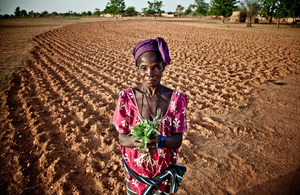DFID Research: Predicting climate change in West Africa
A new book looks at the potential impacts of climate change in the future of West Africa

In Burkina Faso a woman shows what is left to feed her family following drought, bad crops and rising food prices. Picture: P. Tosco/Oxfam
It is anticipated that by 2050 West Africa will make up 7% of the world’s population, rising from the current estimate of around 850 million to 1.7 billion in the under 40 years. The majority of this larger population is expected to live within urban areas on higher incomes than the current average.
This prediction paints a worrying picture of the mounting pressures surrounding the rural poor in this region. With more people to feed and proportionately fewer people to do it, steps need to be taken now to ensure agriculture systems can cope with future demand, both for food and economic growth. Factor in the drastic impact of climate change already taking its toll on West Africa and this challenge becomes ever greater and more urgent.
A new book, entitled West African Agriculture and Climate Change provides a framework of up-to-date scientific information on agro-ecosystems both at regional and country specific level. A collaboration between the International Food Policy Research Institute (IFPRI), the West and Central African Council for Agricultural Research and Development (CORAF/WECARD), and the CGIAR Research Programme on Climate Change, Agriculture and Food Security (CCAFS), the book provides climate data and analysis on 11 of the 16 countries which make up West Africa: Benin, Burkina Faso, Cote d’Ivoire, Ghana, Guinea, Liberia, Niger, Nigeria, Senegal, Sierra Leone, and Togo.
Agriculture is currently the major source of income for most of West Africa with cereals being among the most important food crops. Maize, millet, rice and sorghum are the major cereal crops, however annual yields fall short of the world average and even lag behind other regions in Africa. West Africa is already experiencing rising temperatures and changes in precipitation patterns and while efforts are made to adapt farming systems to the realities of today’s climate this book emphasises the need to anticipate more drastic changes in the future.
It is the first in a series of three monographs looking at West, Central and East Africa. Gerald Nelson, a senior research fellow at IFPRI who led the monograph project, writes in his blog of the need to provide both regional and national policy makers with a better understanding of the uncertainties surrounding the effects of climate change on agriculture and food production in the future. He points out that policy decisions should be shaped by an awareness of what is known and what is not known.
Using sophisticated modeling and available data to develop future scenarios exploring the range of climate change consequences for agriculture, food security, and resource management, the book offers recommendations to national governments and regional agencies.
This book is greatly needed in the West Africa region. It fills a major gap in the availability of up-to-date scientific information on the vulnerability of the agriculture sector to climate change in countries and in the region… This monograph will help regional and national decision makers and other stakeholders make better-informed decisions.
(Robert Zougmoré, regional program leader, West Africa, CCAFS.)
By focusing on individual countries within the broader regional context, the book provides a comprehensive overview of how policies can be implemented cohesively at a country level to build regional resilience.
In addition to country-level analysis and recommendations, the book offers region-wide policy suggestions:
- current data collection efforts on weather, land use, and water resources in the region are inadequate to make policy decisions. In particular, improved data on weather are crucial to help farmers make decisions now, and to inform long-term policies.
- policymakers should incorporate climate change considerations into food security policies—such as those related to crop research, infrastructure, and social services— to prepare for a changing climate while meeting the need for increased quantity and quality of food available to consumers.
- agricultural research and extension agencies should combine efforts at improving yields with those to develop climate-resilient crop varieties. Training farmers about new techniques and technologies to both adapt to and mitigate the effects of climate change is needed.
- governments should enable farmers to access vital inputs required for improved productivity and production.
Gerald Nelson outlines the significance of incorporating climate change into all aspects of policy:
Climate change considerations should be part of all aspects of national and regional planning and decision-making…For example, new roads are essential to raise agricultural productivity. When building them today, plan for higher temperatures and more variable rainfall tomorrow. In some places, expanding irrigation makes a lot of sense for productivity and resilience. When building the infrastructure, plan for more extreme rainfall events and longer droughts than are typical today. These are just a few examples of how improved planning today can increase productivity, enhance resilience in the face of climate change, and raise the incomes of poor farmers in West Africa.
The Department for International Development funds CCAFS through the CGIAR Research Programme. CCAFS aims to overcome the additional threats posed by a changing climate to achieving food security, enhancing livelihoods and improving environmental management. The programme is structured around four main themes: 1. Adaptation to progressive climate change; 2. Adaptation through managing climate risks; 3. Pro-poor climate change mitigation; 4. Integration for decision making.
The programme works towards building climate resilience in agricultural communities by developing the capacity of decision makers to understand and anticipate the influence of climate change.
DFID also provides funding for CORAF/WECARD a project designed to give the rural poor greater access to relevant technology and ensure agriculture policy is better informed by evidence.